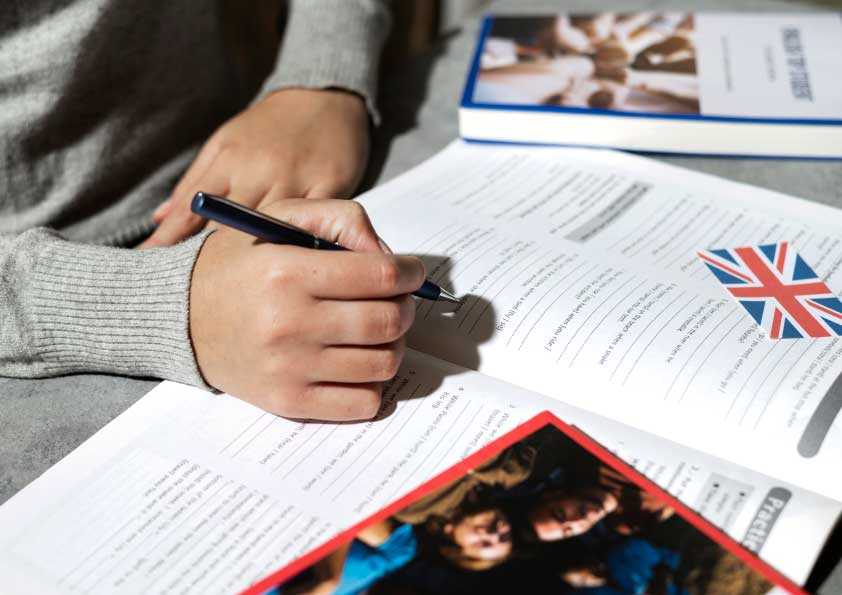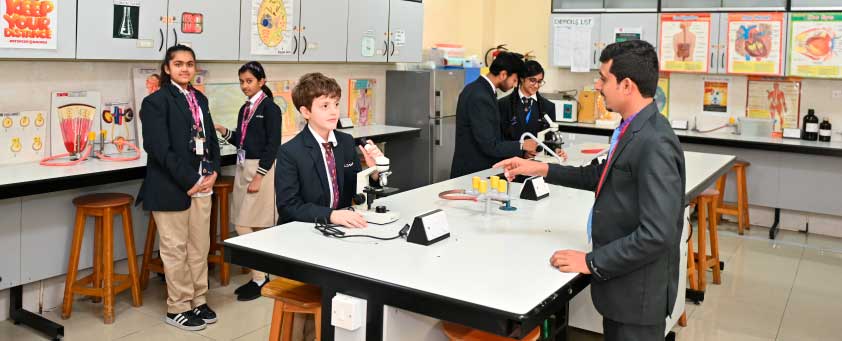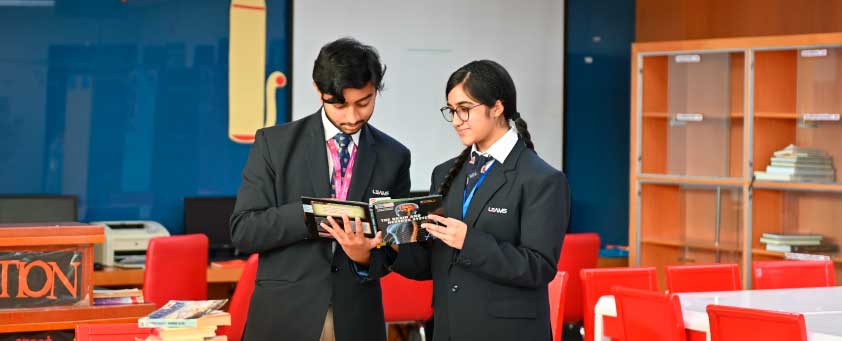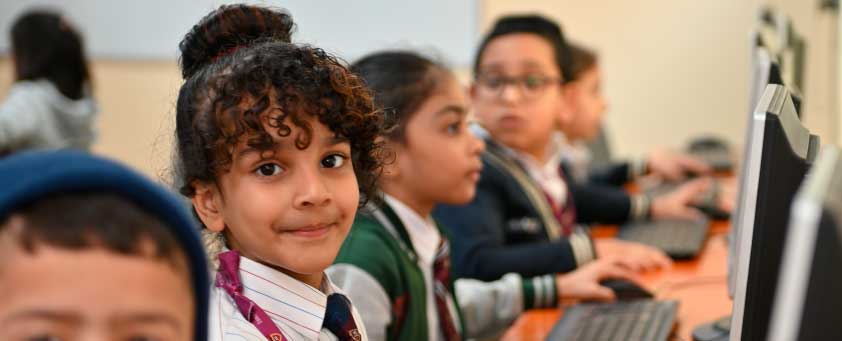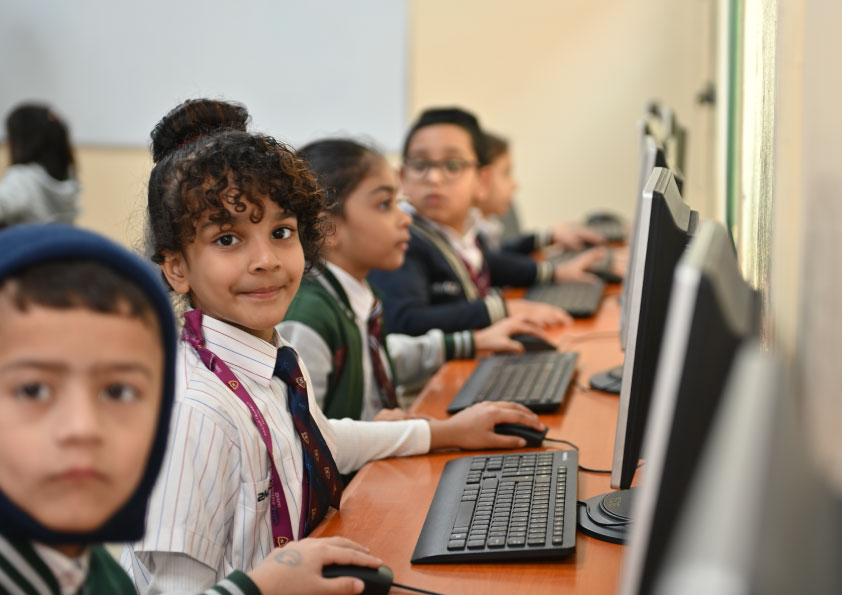Curriculam Overview
our curriculum provides a well-rounded education, emphasizing academic excellence, character development, and global awareness. Join us on a journey of holistic learning and success.
Key Benefits
Preparation
Preparation for secondary education: The CIPP is excellent preparation for the next phase in a student’s education and progresses students seamlessly into middle year curriculum and IGCSE. We provide excellent services to help the students in this phase cruise into the next phase with ease.
Key Stages
The Oxford School is following the UK National Curriculum for students from Foundation Stage (FS) to Post-16. The school curriculum is adapted to the local requirements, supplemented by the UAE Ministry of Education. The school is an accredited Cambridge International Examination, and Edexcel centre prepares students for life beyond the school.
Our programmes are deeply rooted in the Islamic values and Emirati culture by incorporating the world cultures to nurture our students as global citizens. The school is following a skill-based curriculum, that helps students to become confident, reflective, responsible, independent, and compassionate human beings.
The school is following a range of subjects from FS to year 13 to ensure adequate skills are embedded in their system to succeed in this new world. Islamic education is compulsory for the Muslim students from year 2- 13 and the Arabic language is taught for Arab and Non- Arab students separately. Arabic- A is taught for year 2- 13. Arabic- B is compulsory for year 2-10, and it is an optional subject for year 11- 13.
| Key Stage | Age | Year Group |
|---|---|---|
| FOUDATION STAGE | 4 | FS2 |
| KEY STAGE 1 | 5-8 | Year 1 & Year 2 |
| KEY STAGE 2 | 7-12 | Year 3 & Year 6 |
| KEY STAGE 3 | 11-15 | Year 7 & Year 9 |
| KEY STAGE 4 | 14-17 | Year 10 & Year 11 |
| SIXTH FORM | 16-18 | Year 12 & Year 13 |
Foundation Stage
At the Oxford school we ensure that children have a great start to their education, by igniting the passion for learning as they grow.
Our Foundation stage offers a fun academic, stimulating , safe and caring environment where children develop the confidence needed to take on new challenges. Here, children learn essential social skills and thrive on the planned learning opportunities, particularly in early reading, writing, mathematics, and inquiry and exploration. The learning is achieved through the deep focus on engagement, motivation and thinking.
Our dedicated teachers encourage and promote ‘active’ learning throughout all the areas of the Early Years Foundation Stage Curriculum (EYFS), celebrating each child’s achievements and preparing them for a smooth and happy transition into the Primary School. It is organized into the seven areas of learning:
Personal, Social and Emotional Development
Children’s personal, social and emotional development (PSED) is important for children to lead healthy and happy lives and is fundamental to their cognitive development. Strong, warm and supportive relationships with adults enable children to learn how to understand their own feelings and those of others. Children are supported to manage emotions, develop a positive sense of self, set themselves simple goals, have confidence in their own abilities, to persist and wait for what they want and direct attention as necessary. Through adult modelling and guidance, they will learn how to look after their bodies, including healthy eating, and manage personal needs independently.
Through supported interaction with other children, they learn how to make good friendships, co-operate, and resolve conflicts peaceably. These attributes will provide a secure platform from which children can achieve at school and in later life.
Physical Development
Physical activity is vital in children’s all-round development, enabling them to pursue happy, healthy and active lives. Gross and fine motor experiences develop ,we provide our children with sensory exploration opportunities to support development of each child’s strength, co-ordination and positional awareness.
Communication and Language
Children’s daily interactions from an early age form the foundations for language and cognitive development. The environment around the class and school will provide and prompts for ‘talk’. We read frequently to children, and engage them actively in stories, non-fiction, rhymes and poems, and then provide them with extensive opportunities to use and embed new words in a range of contexts, to give children the opportunity to thrive.
Literacy
It is very important for children to develop a love for reading at an early age. Reading and writing form the essential elements of Literacy in EYFS. Reading consists of two dimensions: language comprehension and word reading. Language comprehension (necessary for both reading and writing) starts from birth. It only develops when adults talk with children about the world around them and the books (stories and non-fiction) they read with them, and enjoy rhymes, poems and songs together. Reading is modelled by teachers and the classrooms have a designated ‘Reading area’ rich with books and word cards and offers a quiet and cozy reading environment.
Mathematics
By providing frequent and varied opportunities to build and apply this understanding – such as using manipulatives, including small pebbles and tens frames for organizing counting – children develop a secure base of knowledge and vocabulary from which mastery of mathematics is built. Our curriculum includes rich opportunities for children to develop their spatial reasoning skills across all areas of mathematics. It is important that children develop positive attitudes and interests in mathematics, look for patterns and relationships, spot connections, ‘have a go’, talk to adults and peers about what they notice and not be afraid to make mistakes. In FS2 children will begin verbally counting beyond 10 and compare quantities up to 10. They will further explore and represent patterns within numbers up to 10, even and odd numbers and explore double facts and how quantities can be distributed equally.
Understanding of the World
We provide regular opportunities to children to observe objects and materials. Each classroom has been specifically assigned ‘Investigation are’ to enable children to investigate and explore in a scientific way. Children are introduced to skills which help them in predicting, observing, testing and recording to help them make sense of the world around them. Our designated investigation areas provide open-ended opportunities to make links with other areas. Discovery and hands on learning is at the heart of our curriculum. There are also a range of activities to help children explore different people, cultures and places around them and around the world.
Expressive Arts and Design
Expressive arts and design involves enabling children to explore and play with a wide range of media and materials. It also provides opportunities and encouragement for sharing their thoughts, ideas and feelings through a variety of activities in art, music, movement, dance, role-play, design and technology. A lot of opportunities are provided to children to help develop understanding, self-expression and vocabulary through arts
Primary School - KS1 and KS2
In key stage 1 and 2, keeping in mind the holistic development of our young learners, our focus is to instill 21st-century skills in our students. The curriculum is enriched by exposing students to fun-filled trips where they apply concepts in real-life scenarios. Learning through structured play, student-led conferences, exploring the scientific world through investigations, critical thinking and problem-solving forms an integral part of the Key Stage 1 and 2 curricula.
Key Stage 1 ( Year 1 and 2) Our curriculum in Year 1and 2 provides learners with a carefully supported transition from Reception into Year 1, ensuring that children settle quickly into their new school routines. The Year 1 curriculum embeds strong foundations for English and Maths, whilst promoting a passion for learning in all areas of the curriculum. The Year 2 curriculum ensures thorough and meaningful coverage of Key Stage 1 objectives. Learning is effectively sequenced and children leave Year 2 ready, and excited to engage with the Lower Key Stage 2 curriculum.
Subjects: Arabic, Islamic Education, English, Mathematics, Science, Msc, (Year 2 onwards), Humanities, Computing, PE, PSHe, Art and Design , Music, Guided Reading (Year1), Library, ECA, Islamic Studies (Year 2 onwards)
Key stage 2 ( Year 3 to 6)
Subjects: Arabic, Islamic Education, English, Mathematics, Science, Humanities, French, Computing, PE,MSc, Islamic Studies /PSHE , Art and Design , French, Urdu, ECA, Library.
Secondary School and Sixth Form The school follows the English National Curriculum for KS3 and complies with the Cambridge Secondary Programme for KS4 and KS5. There is a strong impetus on developing a foundation in all key subject areas through a flexible, challenging, inspiring, and culturally sensitive yet international approach.
All school staff support the development of the learner attributes and other qualities identified in the school’s vision. Breadth, balance, and coherence are built-in by design, aim to enrich personal and social outcomes as well as academic goals. The curriculum ensures that the learning does not begin or end in classrooms but permeates the school environment and the broader community.
Key stage 3 (year 7, 8, and 9)
Subjects:
Arabic, Islamic Education/ PSHE, English, Mathematics, Science, French/ Urdu, Computing, PE, Art, History, Geography, Moral Social and Cultural Education, Library
Key stage 4 (year 10 and 11)
Compulsory subjects Year 10
Arabic, Islamic Education/ Value Education, First Language English/ English as a Second Language, Mathematics, PE, Moral Social and Cultural Education
Optional subjects Year 10 (any 6 subjects)
Arabic foreign language, Physics, Chemistry, Biology, Art and design, Economics, Environmental Management, Psychology, Accounting, Business Studies, Travel and Tourism, French, Urdu, Geography, Combined Science, Computer Science, Information and Communication Technology, English Literature, Physical Education.
Compulsory subjects Year 11
Arabic A (for Arab students), Islamic Education/ PSHE, First Language English/ English as a Second Language, Mathematics, Information and Communication Technology, Geography, PE, Moral Social and Cultural Education
Optional subjects Year 11 (any 4 subjects)
Physics, Chemistry, Biology, Art and design, Economics, Environmental Management, Psychology, Accounting, Business Studies, Travel and Tourism, French, Urdu, Enterprise.
Cambridge International Advanced Level/ Pearson Edexcel Level 3 Advanced GCE
The sixth formers (post-16 or key stage 5) are given an option of choosing between Cambridge curriculum and Edexcel qualifications as per their passion and career interest. The school curriculum ensures that learners are prepared well for university study. The curriculum opportunities ensure students can think independently; apply knowledge and understanding to new as well as familiar situations; think logically; present coherent arguments and communicate clearly.
Post -16 Key stage 5 (year 12 and 13)
Compulsory subjects Year 12 and 13
Arabic A (for Arab students), Islamic Education/ PSHE, Moral Social and Cultural Education, PE, Career Counselling/Wellbeing
Optional subjects Year 12 (Minimum of 3 and maximum of 4 subjects)
Mathematics, English Language, Physics, Chemistry, Biology, Economics, Psychology, Accounting, Business Studies, Information Technology, Computer Science, Sociology.
Optional subjects Year 13 (Minimum of 3 and maximum of 4 subjects)
Mathematics, English Language, Physics, Chemistry, Biology, Economics, Psychology, Accounting, Business Studies, Information Technology.
In key stage 1 and 2, keeping in mind the holistic development of our young learners, our focus is to instil 21st-century skills in our students. The curriculum is enriched by exposing students to fun-filled trips where they apply concepts in real-life scenarios. Learning through structured play, student-led conferences, exploring the scientific world through investigations, critical thinking and problem-solving forms an integral part of the Key Stage 1 and 2 curricula.
Explore All Our Curriculums

Curriculum KS1 & KS2
Welcome to The Oxford School, a part of LEAMS Education. On behalf of our entire team..
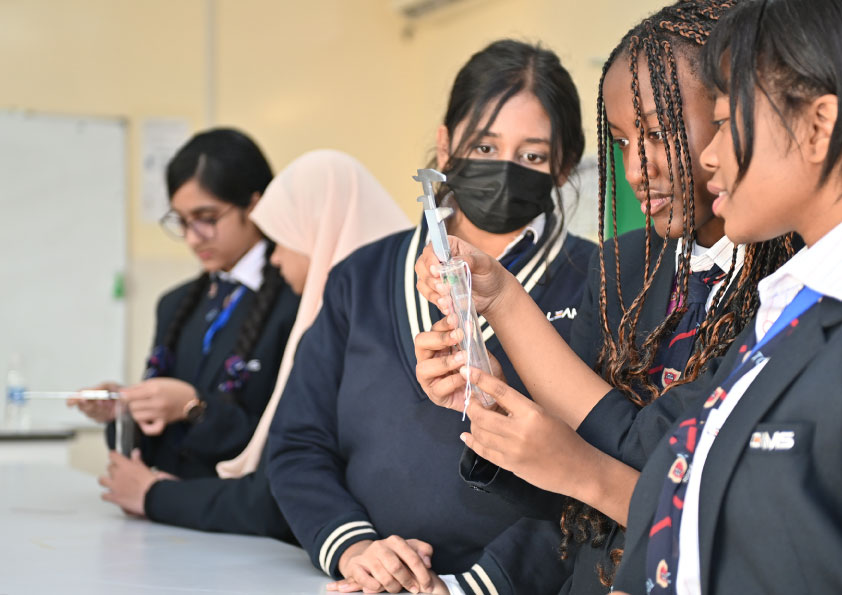
Curriculum KS3
Established in 1988, The Oxford School, Dubai, part of the LEAMS group, provides affordable...
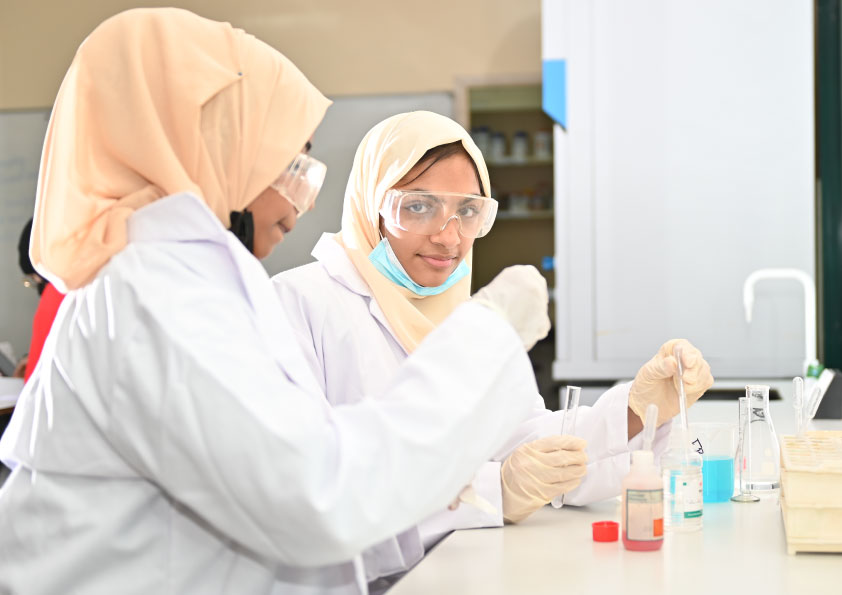
Curriculum KS4
Being in the education sector for more than 40 years, we are constantly in the pursuit...

